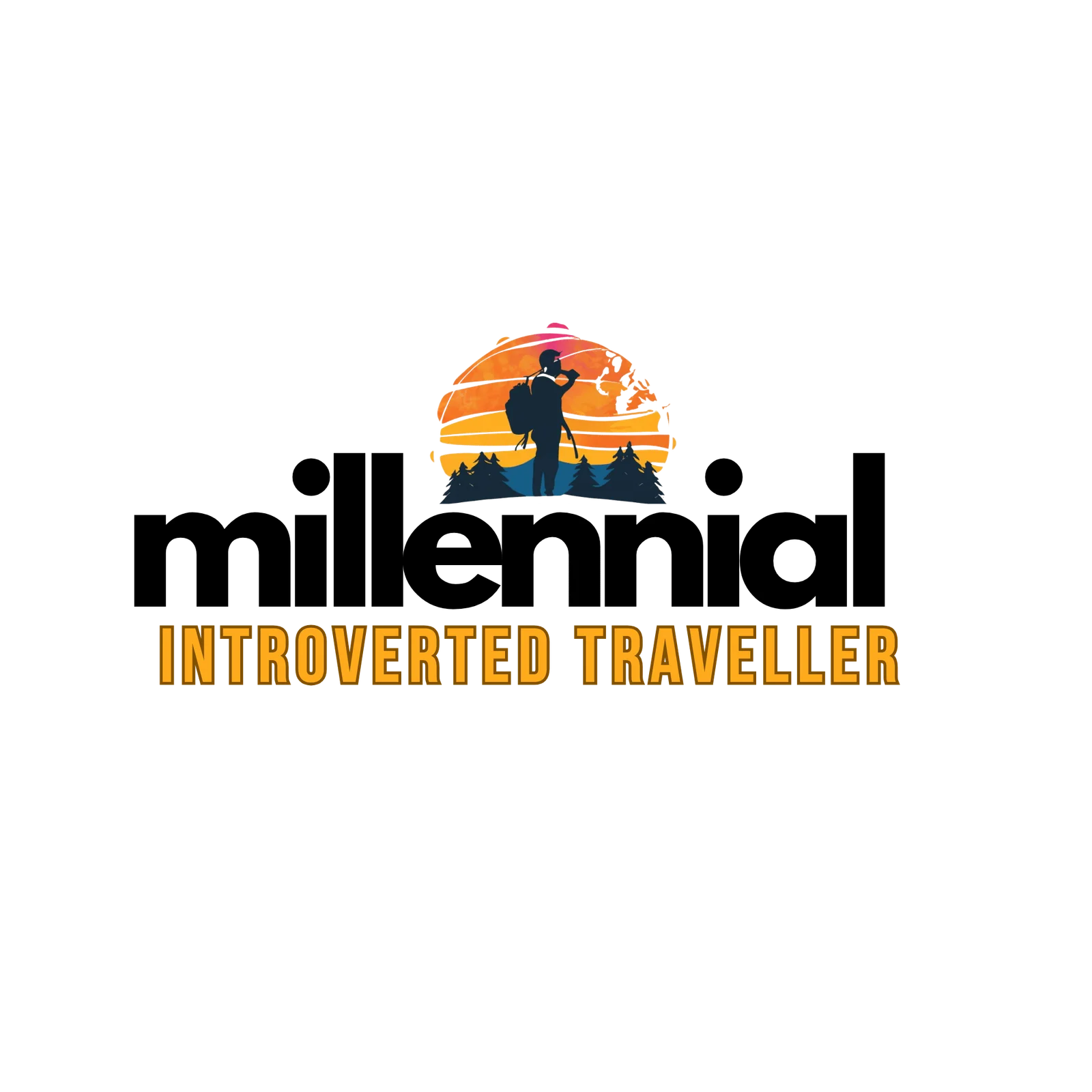Have you ever dreamed of exploring a new destination but couldn’t find anyone to join you?
Or maybe the thought of traveling alone seems intimidating?
Many people postpone their travel dreams because they lack a companion.
But here’s the truth: solo travel can be one of the most rewarding experiences of your life.
What Exactly Is Solo Travel?
Solo travel isn’t just about being physically alone—it’s about experiencing the world without the familiar faces and expectations of people you know.
It includes planning your own itinerary (independent travel), joining group tours, or a mix of both.
At its heart, solo travel means leaving everyone you know behind and embarking on a journey just for you—a chance to discover who you are when nobody’s watching.
Is It Worth Doing a Solo Trip?
Absolutely! Deciding to travel alone could be one of your most life-changing experiences.
It has the power to transform who you are, how you view the world, and even shift your life priorities.
One of the greatest benefits is complete freedom—you get to do exactly what you want, when you want.
Want to spend hours admiring one painting? Go for it! Prefer street food over fancy restaurants? Your choice! No waiting for others or debating where to go next.
But the benefits run much deeper than just flexibility:
- You’ll gain incredible confidence and problem-solving skills
- You’ll develop a better understanding of yourself
- You’ll become more independent and self-reliant
- You’ll be more present and notice details you might otherwise miss
Something magical happens when traveling alone: you become more open to your surroundings. Instead of focusing on your companions, you notice the sights, sounds, and atmosphere. And surprisingly, you’re actually more likely to meet people because you appear more approachable.
Those conversations with strangers? They can genuinely be trip-changing or even life-changing.
Advice and stories from people you meet along the way can enrich your experience in unexpected ways.
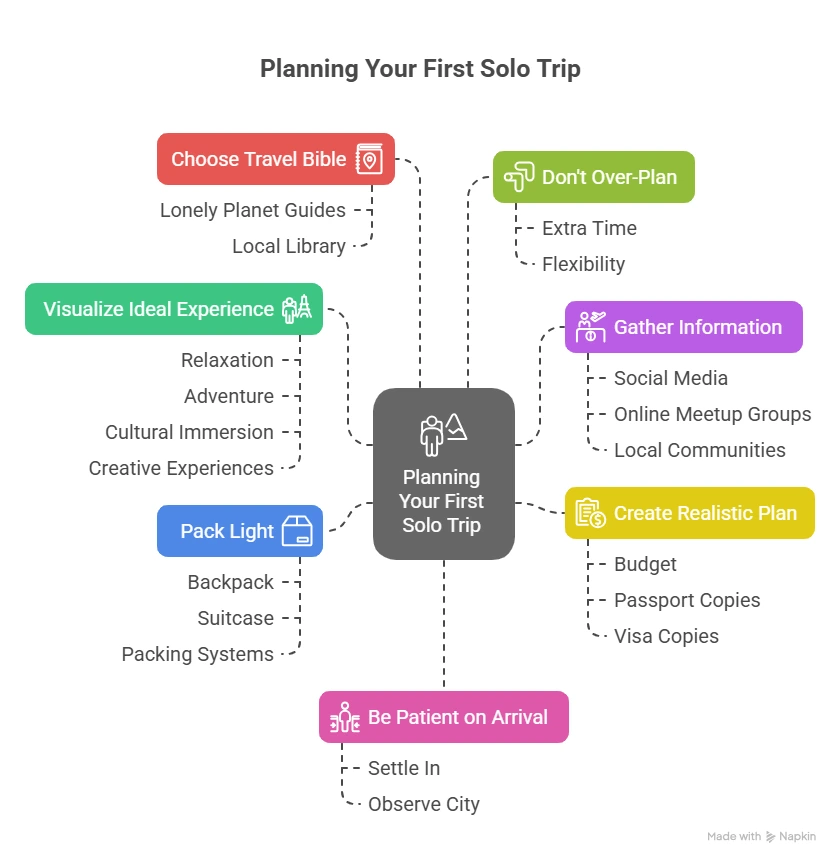
How Do I Plan My First Solo Trip?
Planning a trip just for yourself requires thoughtful preparation. Here’s how to get started:
Visualize Your Ideal Experience
Take time to imagine what kind of trip you want. Are you looking for relaxation, adventure, cultural immersion, or creative experiences? Build your plan around these desires.
Gather Information from Experienced Travelers
Get tips from people who’ve actually visited your destination. Their personal experiences can provide valuable insights on logistics and help you avoid common mistakes. Use social media to connect with friends who’ve been there, join online meetup groups, or find communities of local residents.
The Solo Travel Society on Facebook is an excellent resource for advice and inspiration from fellow solo travelers.
Create a Realistic Travel Plan
A good plan helps you stay organized and mindful of your spending. Make a budget based on what you can realistically afford—not just what you wish you could spend.
Essential Travel Documents
Always carry photocopies of your passport and visa (if required) as backups.
Pack Light
Whether you choose a backpack or suitcase, most people pack far more than they need! Consider using packing systems that help you fit everything into just a carry-on.
Choose a “Travel Bible”
Select a guidebook that matches your budget and travel style. Lonely Planet guides are recommended because they offer options for various budgets, from backpacking to luxury travel. Your guidebook serves as your companion—helping you find local information, events, and places to eat and stay. Check your local library if you don’t want to purchase one.
Don’t Over-Plan
Solo travel requires more energy because you’re managing everything yourself. Build in extra time to relax, wander, or sit at a café. Stay flexible to take advantage of unexpected opportunities.
Be Patient When Arriving
When you first arrive in a new place alone, give yourself time to adjust. Take a moment to settle in, relax, and observe how the city functions.
How Long Should My First Solo Trip Be?
For your first solo adventure, consider starting with a shorter trip—perhaps 4-7 days. This allows you to test the waters without committing to a lengthy journey. A shorter trip helps you:
- Build confidence in your solo travel abilities
- Learn what aspects of solo travel you enjoy most
- Identify your preferred travel style and pace
- Discover any challenges you might need to address on future trips
If you find yourself loving the experience, you can always extend your stay or plan a longer journey next time. Remember, there’s no “perfect” duration—it’s about what makes you comfortable as you explore this new way of traveling.
Is It Normal to Be Scared to Travel Alone?
Yes, absolutely normal! Fear of loneliness and concerns about safety are common among potential solo travelers. Big cities can feel overwhelming when you don’t have someone to talk to. But here’s the good news: solo travel is NOT the same as being lonely.
Feeling nervous before your first solo trip is completely natural. Many experienced solo travelers admit they still get butterflies before setting out alone. These feelings usually fade once you arrive at your destination and begin experiencing the freedom and joy of independent travel.
How to Meet People While Traveling Solo
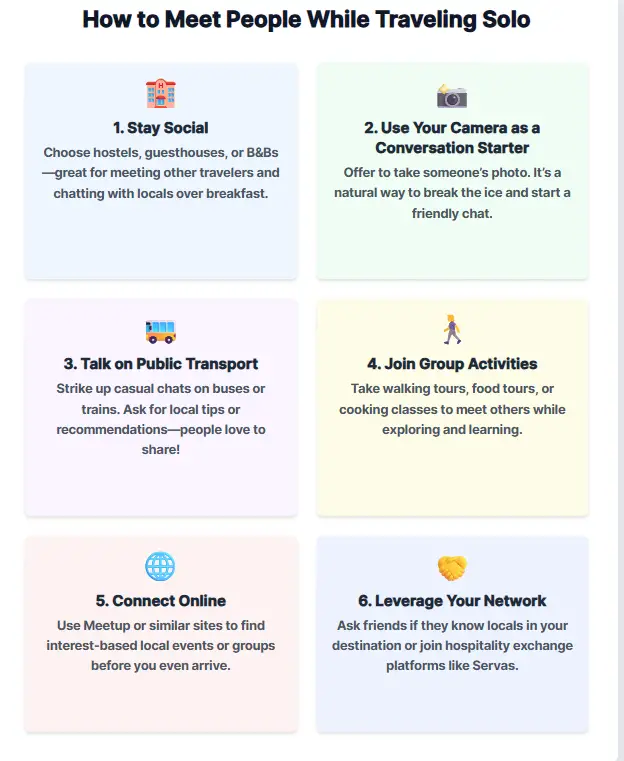
Choose Social Accommodation
Where you stay makes a huge difference in meeting people:
- Hostels offer a ready-made community. They rent single bunks and welcome travelers of all ages. Many even offer private rooms that might be cheaper than budget hotel rooms.
- Small guesthouses or bed & breakfasts provide opportunities to chat with owners or other guests over breakfast.
Break the Ice with Your Camera
Cameras are excellent conversation starters. Offer to take someone’s picture with their phone—it works!
Strike Up Conversations on Public Transportation
Buses and trains are perfect places to meet fellow travelers. Even if you’re an introvert, you can develop the skill of chatting with strangers. Try asking other travelers for tips or locals for hidden gems.
Join Group Activities
Day tours, walking tours, food tours, or cooking classes let you experience the destination while enjoying social interaction and giving your planning brain a break. Remember, solo travelers aren’t necessarily people who only want to be alone!
Find Like-Minded People Online
Use websites like Meetup to find groups that share your interests, such as photography walks or book clubs.
Tap into Your Social Network
Check if any friends of friends live in your destination. You can also explore hospitality networks like Servas, which connect travelers with hosts for cultural exchange.
How to Handle Dining Alone
Eating alone in restaurants feels awkward to some people.
But dining solo is actually common in many places like Europe and the US—you won’t stand out.
If you’re nervous about it, practice dining alone in your hometown first to build confidence.
Tips for enjoyable solo dining:
- If you want company, invite other solo travelers to join you
- Look for popular restaurants with shared tables
- Eat in hostel kitchens where there are usually people around
- Spend time at cafés where you can people-watch, journal, or plan your next adventures
How to Stay Safe When Solo Traveling
Safety is particularly important when traveling alone. You need to be self-reliant and extra aware of your surroundings.
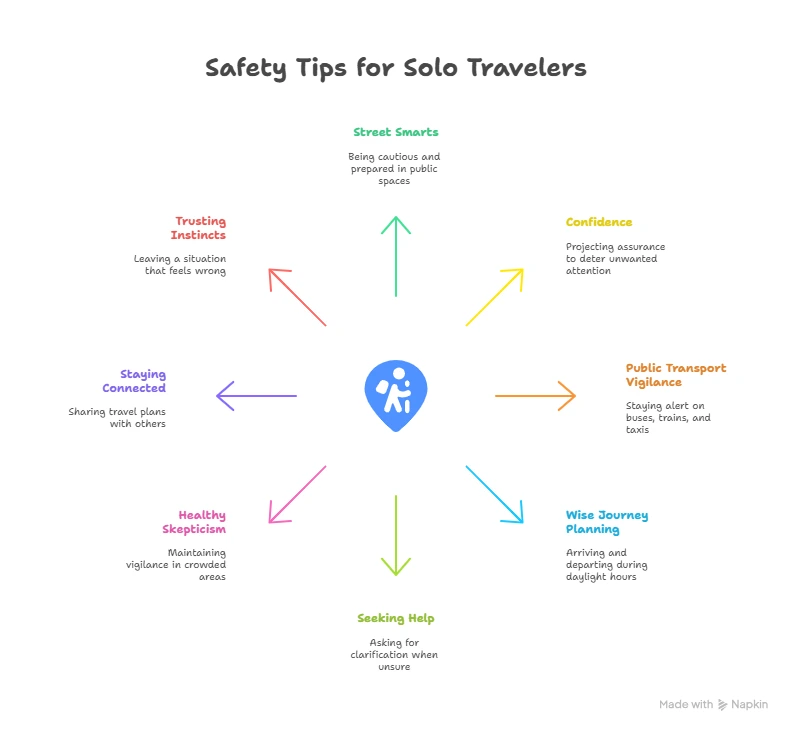
Safety Tips for Solo Travelers
- Use street smarts: Be prepared and cautious about relying on strangers. Keep your money, map, guidebook, and phrasebook accessible but not obvious.
- Project confidence: Walk with purpose, head up, like you know where you’re going. If you’re lost, be selective about who you ask for help—look for police, families, or go into stores or restaurants.
- Be cautious with public transportation: Use the same vigilance you would at home on buses, trains, and in taxis.
- Plan long journeys wisely: Arrange to arrive and depart during daylight hours when possible. Visit the station a day before your departure to familiarize yourself with the location.
- Ask for help when needed: Don’t be afraid to seek clarification if you’re unsure about something, especially if there’s a language barrier. Locals often look out for travelers.
- Maintain healthy skepticism: Stay vigilant, especially in crowded or isolated areas.
- Stay connected: Share your travel plans with people back home. Inform hotel staff about your evening plans before heading out.
- Trust your instincts: If a situation feels wrong, leave immediately. It’s always better to be safe.
What is the Safest Destination for Solo Travelers?
Some destinations are particularly well-suited for solo travelers, especially first-timers concerned about safety:
- Japan: Extremely low crime rates, efficient public transportation, and helpful locals make Japan a top choice for solo travelers.
- New Zealand: Known for friendly residents, excellent infrastructure, and stunning natural beauty, New Zealand is perfect for adventure-minded solo travelers.
- Iceland: With one of the lowest crime rates globally and breathtaking landscapes, Iceland provides a safe environment for independent exploration.
- Canada: Welcoming locals, diverse cities, and spectacular natural attractions make Canada an excellent choice for English speakers new to solo travel.
- Portugal: Affordable, beautiful, and safe, Portugal offers charming cities, beautiful beaches, and a welcoming atmosphere for solo visitors.
These destinations combine safety with good tourism infrastructure, making them ideal for building your solo travel confidence.
Where is the Best Place to Solo Travel for the First Time?
For your first solo adventure, consider destinations that offer:
- Safety and low crime rates
- Well-developed tourism infrastructure
- Ease of communication (English widely spoken)
- Good public transportation
- Friendly locals
Based on these criteria, some excellent first-time solo destinations include:
- Ireland: Friendly locals who speak English, beautiful landscapes, and efficient public transportation make Ireland perfect for first-timers.
- Denmark: Safe cities, excellent English proficiency, and efficient public transportation systems make exploring easy.
- Australia: English-speaking, friendly locals, and well-established backpacker routes make Australia approachable for solo travelers.
- Singapore: Extremely safe, clean, with excellent public transportation and English widely spoken.
- Costa Rica: Well-established tourism infrastructure, friendly locals, and numerous group activities for meeting other travelers.
Is Solo Travel Healthy?
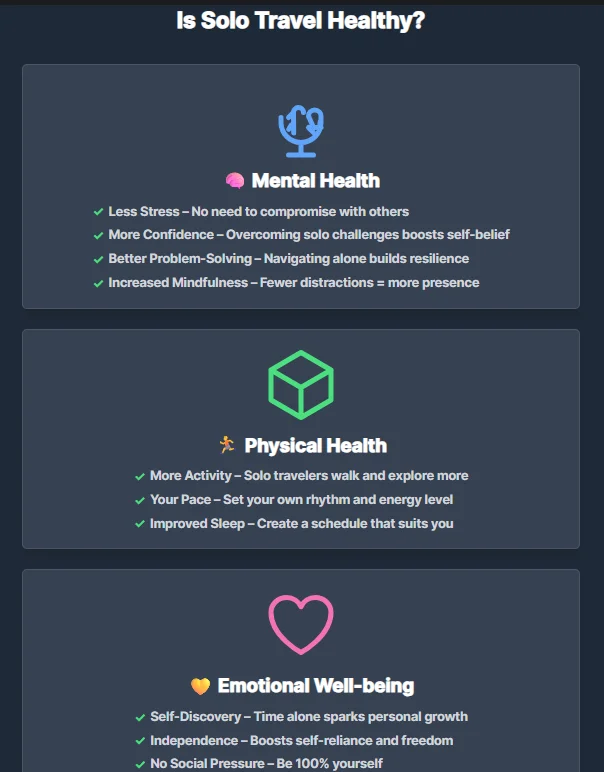
Research suggests that solo travel offers significant health benefits beyond just enjoyment:
Mental Health Benefits
- Reduced stress: Making decisions solely for yourself eliminates the compromise-related stress that can occur when traveling with others.
- Increased self-confidence: Successfully navigating challenges alone builds lasting confidence that extends beyond your travels.
- Improved problem-solving skills: Finding solutions independently develops mental resilience.
- Enhanced mindfulness: Solo travelers often report being more present and observant without the distraction of companions.
Physical Health Benefits
- Active exploration: Solo travelers typically walk more and engage in more physical activities.
- Personalized activity level: You can set your own pace without having to accommodate others’ preferences or limitations.
- Better sleep patterns: The freedom to establish your own schedule can lead to more natural sleep patterns.
Emotional Well-being
- Self-discovery: Time alone provides space for reflection and personal growth.
- Independence: Solo travel fosters self-reliance and self-sufficiency.
- Freedom from social pressures: You can be your authentic self without worrying about others’ expectations.
Is Solo Travel Good for Introverts?
Absolutely! Solo travel can be particularly rewarding for introverts for several reasons:
- Control over social interaction: You decide when and how much to socialize
- Freedom from social exhaustion: No pressure to constantly engage with travel companions
- Space for reflection: Plenty of quiet time to process experiences
- Self-paced activities: No need to accommodate others’ energy levels or preferences
- Authentic connections: Meaningful interactions on your own terms
Many introverts find that solo travel allows them to engage with the world in a way that respects their need for solitude while still providing opportunities for connection.
You can retreat to your accommodation when you need alone time, then venture out for social experiences when you feel energized.
Some introverts even report feeling more comfortable socializing while traveling than at home because these interactions have natural time limits and clear purposes (like asking for directions or joining a day tour).
What Are the Disadvantages of Traveling Alone?
While solo travel offers tremendous benefits, it’s important to acknowledge some potential challenges:
Financial Considerations
- Single supplements: Hotels often charge almost the same rate for single occupancy as double occupancy
- No cost sharing: Transportation, accommodation, and guides can’t be split with companions
- Safety expenses: You might choose pricier but safer options for accommodation or transportation
Practical Challenges
- Managing all logistics yourself: From bookings to navigation to problem-solving
- Watching your belongings: No one to keep an eye on your stuff while you use the restroom
- Taking photos: Capturing yourself in pictures requires creativity or asking strangers
- Security concerns: Being alone can make you more vulnerable in certain situations
Emotional Aspects
- Occasional loneliness: Some experiences feel better when shared
- Decision fatigue: Constantly making every choice yourself can become tiring
- No shared memories: No one to reminisce with about your specific experiences
Despite these challenges, most solo travelers find that the benefits far outweigh the drawbacks, and many develop strategies to address these issues effectively.
Is It Risky to Travel Alone?
Solo travel isn’t inherently risky when approached with proper preparation and awareness. The key is making informed decisions:
- Research your destination thoroughly: Understand local customs, safe areas, and potential risks
- Stay connected: Keep family or friends updated on your whereabouts
- Trust your instincts: If something feels wrong, remove yourself from the situation
- Plan ahead: Book accommodation in advance, especially for night arrivals
- Stay aware: Maintain situational awareness, especially in unfamiliar environments
- Limit alcohol consumption: Stay clear-headed in unfamiliar surroundings
- Prepare for emergencies: Know local emergency numbers and the location of your country’s embassy
With thoughtful preparation, solo travel can be just as safe as traveling with companions—and sometimes even safer, as you’re more likely to stay alert and make cautious decisions when responsible for yourself.
What to Know Before Solo Travel?
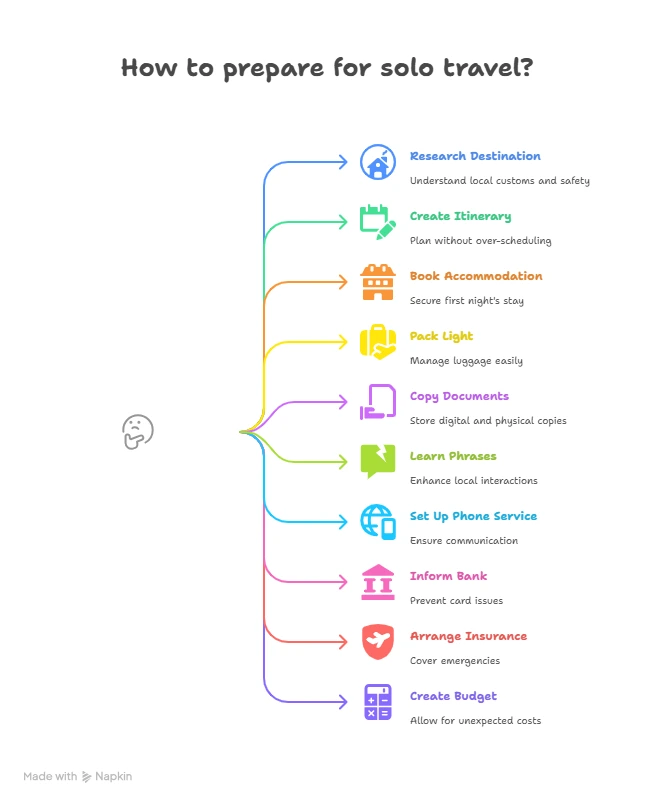
Essential Preparation Tips
- Research your destination: Understand local customs, transportation options, and general safety
- Create a loose itinerary: Have a framework without over-scheduling
- Book your first night’s accommodation: Arrive with a place to stay
- Pack light: You’ll be managing all your luggage yourself
- Make copies of important documents: Store digital and physical copies separately
- Learn basic local phrases: Even simple greetings can make a big difference
- Set up international phone service: Ensure you can navigate and communicate
- Inform your bank of travel plans: Prevent your cards from being frozen
- Arrange travel insurance: Cover yourself for emergencies and cancellations
- Create a budget with buffer: Allow for unexpected expenses
Making the Most of Your Destination
Explore in Various Ways
Experience a city through different perspectives—on foot, by bike, public transport, or even taxi. Each mode of transportation reveals different aspects of a place.
Engage with Local Culture
Attend street festivals, sporting events, or community arts shows. These experiences provide authentic insights into local life beyond tourist attractions.
Discover Through Food
Local cuisine offers a window into culture, history, and geography. Make an effort to eat where locals eat and try regional specialties.
Shop Where Locals Shop
Visit grocery stores, hardware stores, or specialty shops for a glimpse into everyday life. You don’t need to buy anything—just observing can be fascinating.
Embrace Evenings
Don’t retreat to your room just because you’re alone. Cities often transform at night, especially in places like Europe where town centers remain lively and safe after dark. Take evening walks on well-lit streets, enjoy outdoor cafés, or attend musical performances (perfect if there’s a language barrier).
If you prefer staying in some evenings, consider booking accommodation with a balcony overlooking a busy area to maintain a connection with the city’s energy.
Taking Care of Your Wellbeing While Traveling Solo
Self-care remains important during your travels. Be kind to yourself both at home and on the road. Self-kindness means being compassionate, forgiving yourself when things don’t go perfectly, and ensuring your basic needs are met.
Maintain your wellbeing routines while traveling, whether that’s morning meditation, regular exercise, or quiet reading time.
Bringing a comfort item from home—something as simple as your favorite snack—can help with occasional homesickness.
It’s perfectly normal to experience moments of self-doubt while planning or during your trip. That sudden “What am I doing?” feeling happens to most solo travelers. Keep going; this feeling typically passes quickly.
Wrapping Things Up
Traveling alone offers a unique journey of world exploration and self-discovery. It provides special rewards like freedom, personal growth, and increased confidence that partnered travel simply can’t match.
While concerns about loneliness or safety are natural, with thoughtful planning, awareness, and an open mind, these challenges can be effectively managed. The tips provided here offer practical ways to meet people, stay safe, and enjoy every moment of your independent journey.
So dare to imagine the possibilities. The world is vast and filled with places waiting for your discovery. As you plan and go, remember to be kind to yourself. Your solo adventure is truly a gift from you, to you.
Happy travels!
